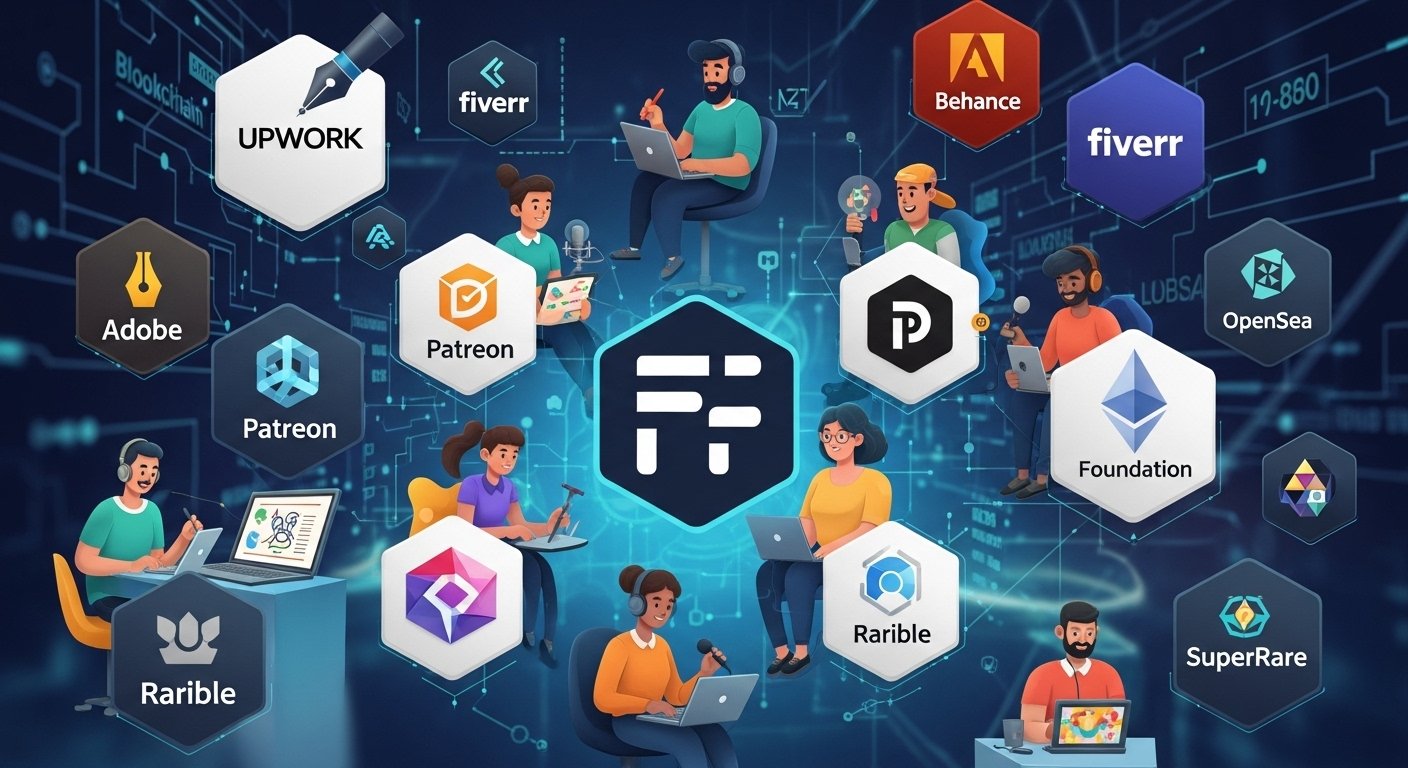Web3 Tools for Freelancers 2025 Boost Your Productivity
Web3 Tools for Freelancers 2025. Boost productivity with decentralized platforms, crypto payments, and blockchain-powered solutions.

Web3 technologies is reshaping how independent professionals work, collaborate, and get paid. Gone are the days when freelancers relied solely on traditional platforms that took hefty commissions and controlled every aspect of the working relationship. Today’s digital nomads and remote workers are discovering that decentralized tools offer unprecedented freedom, transparency, and efficiency.
Web3 represents the next evolution of the internet, built on blockchain technology and emphasizing decentralization, user ownership, and peer-to-peer interactions. Web3 Tools for Freelancers 2025: For freelancers, this means access to platforms and tools that eliminate intermediaries, reduce fees, enable instant global payments, and provide verifiable proof of work and credentials. Whether you’re a graphic designer, content writer, software developer, or virtual assistant, understanding and leveraging these blockchain-based solutions can give you a competitive edge in an increasingly crowded marketplace.
The beauty of Web3 tools lies not just in their technological sophistication but in their practical applications. These platforms are solving real problems that freelancers face daily, from payment delays and currency conversion fees to intellectual property protection and client trust issues. As traditional freelancing platforms become more saturated and their fee structures more burdensome, many independent professionals are turning to decentralized alternatives that put control back in their hands.
In this comprehensive guide, we’ll explore the most incredible Web3 tools that every forward-thinking freelancer should know about in 2025. These aren’t just theoretical concepts or futuristic possibilities; they’re working solutions that thousands of freelancers are already using to streamline their workflows, secure better payment terms, and build more sustainable careers. From decentralized freelancing marketplaces to cryptocurrency payment processors and blockchain-based project management systems, we’ll cover the essential tools that can genuinely boost your productivity and profitability.
Web3 and Its Impact: Web3 Tools for Freelancers 2025
Before diving into specific tools, it’s crucial to grasp what makes Web3 technology revolutionary for freelancers. Unlike Web2 platforms, where companies control user data and transactions, Web3 operates on decentralized networks where participants have direct ownership and control. This fundamental shift means that when you use a Web3 freelancing platform, you’re not at the mercy of a corporation that can change terms, freeze accounts, or take excessive fees without warning.
The blockchain foundation of Web3 ensures transparency in all transactions. Every payment, contract, and agreement is recorded on an immutable ledger that both parties can verify. This eliminates many of the trust issues that plague traditional freelancing relationships. Clients can see that funds are secured in smart contracts, while freelancers have assurance that payment will be released upon meeting agreed-upon milestones.
Smart contracts automate many of the administrative tasks that consume valuable time. These self-executing agreements trigger payments automatically when conditions are met, removing the need for manual invoicing and chasing clients for payment. For freelancers juggling multiple projects, this automation translates directly into increased productivity and reduced administrative overhead.
Decentralized Freelancing Marketplaces
The emergence of decentralized marketplaces represents one of the most significant developments in the freelancing ecosystem. These platforms connect freelancers directly with clients without a central authority controlling the relationship or extracting substantial fees. Traditional platforms often charge between fifteen and twenty percent in fees, but decentralized alternatives typically operate with minimal costs since there’s no corporate intermediary to support.
Platforms like Braintrust have pioneered the concept of user-owned networks where freelancers and clients collectively govern the marketplace. Token holders vote on platform decisions, ensuring that changes benefit the community rather than shareholders. This democratic approach creates an environment where freelancers have a genuine voice in how their workplace operates.
These marketplaces also address reputation portability, a major pain point in traditional freelancing. Your reviews, ratings, and work history on a blockchain-based platform belong to you and can potentially be verified across different platforms. This creates a portable professional identity that follows you throughout your career, making it easier to establish credibility when joining new platforms or engaging with new clients.
Benefits of Decentralized Work Platforms
Working through decentralized platforms offers tangible advantages beyond lower fees. The transparent nature of blockchain means you can verify a client’s payment history and reliability before accepting projects. Similarly, clients can review immutable records of your completed work and feedback from previous engagements. This mutual transparency builds trust faster than traditional systems, where information can be hidden or manipulated.
Payment security improves dramatically through escrow smart contracts that hold funds until work is completed and approved. Unlike traditional platforms, where payment disputes can drag on for weeks, smart contracts execute automatically based on predetermined conditions. If disputes arise, decentralized arbitration systems allow neutral third parties to review the blockchain evidence and make fair determinations.
Cryptocurrency Payment Processors for Freelancers
Managing payments across borders has always been a challenge for freelancers working with international clients. Traditional banking systems involve multiple intermediaries, currency conversion fees, and delays that can stretch from several days to weeks. Cryptocurrency payment solutions eliminate these friction points by enabling near-instantaneous transfers with minimal fees regardless of geographic location.
Tools like Request Network allow freelancers to create professional invoices that clients can pay using various cryptocurrencies or even traditional payment methods that convert to crypto. The platform handles the technical complexity while providing a familiar invoicing interface. Each payment is recorded on the blockchain, creating an auditable trail for tax purposes and financial planning.
For freelancers who prefer to receive payments in stable cryptocurrencies that don’t experience wild price fluctuations, stablecoins offer the perfect solution. These digital currencies maintain value pegged to traditional currencies like the US dollar, providing the benefits of crypto transactions without volatility concerns. Processing a stablecoin payment from a client in another country costs a fraction of what traditional wire transfers charge and arrives in minutes rather than days.
Managing Crypto Earnings Efficiently
As you start receiving cryptocurrency payments, having proper tools to manage these assets becomes essential. Digital wallets designed specifically for freelancers offer features like automatic conversion to preferred currencies, integration with accounting software, and easy tax reporting. These wallets act as your financial command center, allowing you to track earnings across multiple tokens and blockchains from a single dashboard.
Some advanced platforms provide instant conversion services, letting you receive payments in one cryptocurrency while automatically converting to another based on your preferences. This flexibility is particularly valuable when clients prefer to pay in tokens you don’t want to hold long-term. The ability to automatically convert volatile cryptocurrencies into stablecoins or traditional currencies protects your earnings from market fluctuations.
Blockchain-Based Project Management Tools
Effective project management separates successful freelancers from those who constantly struggle with deadlines and client satisfaction. Web3 project management platforms combine the familiar functionality of traditional tools with blockchain benefits like transparency, automated payments, and verifiable progress tracking. These systems create an immutable record of project milestones, deliverables, and communications that all parties can reference.
Decentralized storage solutions integrated into these platforms ensure that your project files remain secure and accessible without depending on a single company’s servers. Your design files, documents, and other deliverables are distributed across a network, making them resistant to data loss while maintaining your ownership rights. This is particularly important for freelancers concerned about intellectual property protection and long-term access to their work portfolios.
Smart contract integration takes project management to another level by tying task completion directly to payment release. When you mark a milestone as complete and the client verifies it, payment automatically transfers from the escrow contract to your wallet. This eliminates the awkward conversations about payment and ensures you’re compensated promptly for completed work.
Collaborative Features in Web3 Tools
Modern freelancing often involves collaboration with other independent professionals. Decentralized collaboration tools facilitate teamwork while maintaining individual ownership and clear attribution of contributions. Blockchain records precisely who contributed what to a project, making revenue sharing transparent and automated when projects generate ongoing income.
These platforms also support decentralized autonomous organizations (DAOs), allowing groups of freelancers to form collectives that bid on larger projects together. The DAO structure provides governance mechanisms for group decision-making and automated profit distribution based on contribution levels recorded on the blockchain. This enables solo freelancers to access opportunities typically reserved for agencies while maintaining their independence.
Decentralized Identity and Credential Verification
Building trust with new clients requires proving your expertise and track record. Blockchain-based identity systems create verifiable credentials that can’t be faked or manipulated. When you complete a certification, earn a degree, or finish a project, the credential is recorded on the blockchain with cryptographic proof of authenticity. Clients can instantly verify your qualifications without contacting previous employers or educational institutions.
These decentralized identity solutions solve the problem of platform lock-in that plagues traditional freelancing. Your reputation and credentials exist independently of any single platform, meaning you’re not starting from zero each time you join a new marketplace or seek clients through different channels. Your professional identity becomes truly portable and verifiable across the entire Web3 ecosystem.
Privacy controls built into these systems let you decide exactly what information to share with potential clients. You might prove you have certain certifications or years of experience without revealing personal details like your exact education history or location. This selective disclosure gives you control over your professional image while still providing the verification clients need to trust your capabilities.
Content Creation and NFT Platforms for Freelancers
Creative freelancers are discovering powerful new revenue models through non-fungible tokens (NFTs) and blockchain-based content platforms. Instead of selling one-time services, you can tokenize your work and earn ongoing royalties whenever it’s resold. A graphic designer might create a series of digital artworks that generate income long after the initial sale, providing passive revenue streams that traditional freelancing never offered.
Platforms supporting fractional ownership allow multiple people to invest in high-value creative works, expanding your potential client base beyond those who can afford exclusive rights. This democratization of access means more opportunities to monetize your creativity while maintaining attribution and earning automatic royalties on secondary sales through smart contracts.
For writers and content creators, decentralized publishing platforms offer alternatives to traditional content mills and platforms that control distribution and monetization. You retain ownership of your work while reaching audiences directly, keeping a larger share of revenue generated from your content. Blockchain verification proves authorship and protects against plagiarism in ways traditional copyright systems struggle to match.
Financial Tools and Tax Management for Web3 Income
Navigating the tax implications of cryptocurrency earnings can be daunting, but specialized Web3 financial tools simplify this complexity. These platforms automatically track all your crypto transactions, calculate gains and losses, and generate reports formatted for tax authorities in your jurisdiction. As tax regulations around cryptocurrency continue evolving, having accurate records from the start protects you from compliance issues down the line.
Budgeting and financial planning tools adapted for Web3 income help freelancers manage the volatility and complexity of earning in multiple cryptocurrencies. These applications can aggregate balances across different wallets and blockchains, providing a comprehensive view of your financial position. They also support scenario planning, showing how different market conditions might affect your earnings and helping you make informed decisions about when to convert crypto holdings to traditional currency.
Some platforms offer lending and borrowing services where you can use cryptocurrency holdings as collateral for loans without selling your assets. This provides liquidity during slow periods while allowing you to maintain exposure to potential appreciation in your crypto holdings. For freelancers building long-term wealth in Web3, these financial tools become increasingly important for sophisticated portfolio management.
Communication and Collaboration in the Decentralized Web
Secure communication channels are essential when working remotely with clients and collaborators worldwide. Decentralized messaging platforms offer end-to-end encrypted conversations without central servers that could be compromised or accessed by third parties. Your business communications remain private and under your control, an important consideration when discussing sensitive project details or proprietary client information.
Video conferencing tools built on Web3 principles provide similar privacy benefits while often costing less than traditional services. Some platforms reward participants with tokens for hosting meetings or contributing bandwidth, creating new micro-earning opportunities from activities you’re already doing. These tokenomic models demonstrate how Web3 rethinks value creation and distribution in everyday professional tools.
File sharing through decentralized networks ensures that important documents remain accessible even if individual nodes go offline. The distributed nature of these systems provides redundancy that centralized cloud services can’t match, while encryption keeps your files private. For freelancers handling sensitive client data, these security and reliability improvements offer genuine peace of mind.
Learning and Skill Development in Web3
The rapid evolution of Web3 technology means continuous learning is essential for freelancers wanting to stay competitive. Blockchain-based learning platforms offer courses and certifications with credentials that live on the blockchain, providing verifiable proof of your ongoing professional development. Unlike traditional certificates that employers must contact institutions to verify, blockchain credentials offer instant authentication that enhances your professional profile.
Many Web3 education platforms use token incentives to reward learning progress, allowing you to earn while developing new skills. This learn-to-earn model makes professional development more accessible by offsetting the cost of courses with earned tokens. Some platforms also feature community-governed curriculums where learners collectively decide what courses and skills should be prioritized, ensuring content remains relevant to market demands.
Decentralized knowledge-sharing communities connect freelancers across specializations, creating networking opportunities and collaborative learning environments. These communities often operate as DAOs where members contribute expertise and vote on community direction. Participating in these networks helps you stay current with Web3 trends while building relationships with other professionals who might become collaborators or referral sources.
Conclusion
The Web3 revolution is fundamentally changing what it means to be a freelancer in 2025. The tools we’ve explored represent more than just technological upgrades to existing solutions; they embody a philosophical shift toward user ownership, transparency, and fair value exchange. By embracing these decentralized platforms and blockchain-based tools, freelancers can reduce costs, increase payment security, automate administrative tasks, and build more sustainable career models.
The transition to Web3 tools doesn’t require abandoning traditional platforms overnight. Many freelancers successfully blend both approaches, using conventional marketplaces for certain client types while leveraging decentralized tools for payment processing, project management, and reputation building. The key is understanding what each tool offers and strategically incorporating those that address your specific pain points and goals.
As Web3 technologies mature and adoption increases, early adopters position themselves advantageously in the evolving freelance economy. The skills and reputation you build in these decentralized ecosystems today will become increasingly valuable as more clients and projects migrate to Web3 platforms. The incredible tools we’ve discussed aren’t just productivity boosters; they’re investments in your professional future and autonomy as an independent worker.
The freelancing landscape will continue evolving, but the direction is clear: greater decentralization, stronger user control, and more equitable value distribution. By exploring and adopting these Web3 tools now, you’re not just keeping pace with change—you’re positioning yourself at the forefront of how work gets done in the digital age. The productivity gains, financial benefits, and professional opportunities available through these platforms make them essential knowledge for any serious freelancer in 2025 and beyond.
FAQs
Q: Do I need technical knowledge to use Web3 freelancing tools?
While Web3 tools are built on complex blockchain technology, most platforms designed for freelancers prioritize user-friendliness and require minimal technical expertise. The interfaces often resemble traditional applications you’re already familiar with, handling the blockchain complexity in the background.
Q: Are cryptocurrency payments safe, and how do I handle price volatility?
Cryptocurrency payments are generally very secure due to blockchain technology’s cryptographic protection, but managing volatility requires a strategy. Many freelancers immediately convert volatile cryptocurrencies into stablecoins or traditional currency upon receipt to protect against price fluctuations.
Q: Can I use Web3 tools while still working on traditional freelancing platforms?
Absolutely, and many freelancers take this hybrid approach during their transition to Web3. You can continue using established platforms for finding clients while incorporating Web3 tools for specific functions like payment processing, project management, or credential verification.
Q: How do taxes work when earning cryptocurrency as a freelancer?
Tax treatment of cryptocurrency earnings varies by jurisdiction, but most tax authorities consider crypto income as taxable when received, with the value at receipt time determining your taxable income. Subsequent gains or losses from holding the cryptocurrency are typically treated as capital gains or losses.
Q: What happens if a Web3 platform shuts down or fails?
One of Web3’s key advantages over traditional platforms is that your data, reputation, and often your work history exist on the blockchain rather than solely on a company’s servers. If a Web3 platform ceases operations, your blockchain-based credentials, transaction history, and reputation remain accessible and verifiable.


